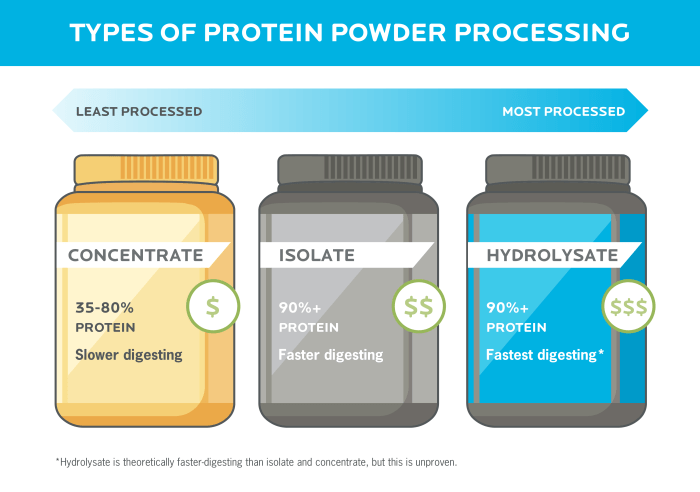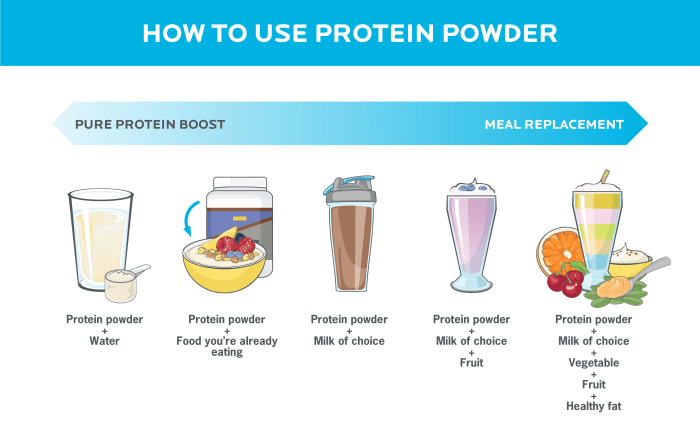Delving into the world of protein powder usage, this guide provides a comprehensive overview of its benefits, risks, and applications. From muscle building to weight management, protein powder has become an integral part of many fitness and health regimens.
This in-depth exploration will delve into the different types of protein powders available, their potential side effects, and the importance of consulting a healthcare professional before incorporating them into your diet. Additionally, it will provide practical tips for calculating individual protein needs and incorporating protein powder into a balanced nutrition plan.
Protein Powder Overview

Protein powder is a dietary supplement that provides a concentrated source of protein. It is typically made from whey, casein, soy, or pea protein and is available in a variety of flavors and forms, including powders, shakes, and bars. Protein powder is often used by athletes, bodybuilders, and other individuals who want to increase their protein intake.There
are many different types of protein powders available, each with its own unique benefits and drawbacks. Whey protein is the most popular type of protein powder and is quickly absorbed by the body. Casein protein is absorbed more slowly than whey protein and can help to keep you feeling full for longer.
Soy protein is a good option for vegans and vegetarians and is also a good source of isoflavones, which have antioxidant properties. Pea protein is another good option for vegans and vegetarians and is hypoallergenic.When choosing a protein powder, it is important to consider your individual needs and goals.
If you are looking for a fast-absorbing protein powder that can help you to build muscle, whey protein is a good option. If you are looking for a protein powder that can help you to feel full for longer, casein protein is a good option.
If you are vegan or vegetarian, soy protein or pea protein are good options.
Benefits of Protein Powder Usage

Incorporating protein powder into your diet can offer a range of benefits, from supporting muscle growth and recovery to aiding in weight management and overall well-being.
Muscle Building and Recovery
Protein is an essential nutrient for building and repairing muscle tissue. Consuming protein powder can help:
- Increase muscle mass and strength
- Reduce muscle soreness and promote recovery after exercise
- Support muscle growth and maintenance during weight loss or aging
Weight Management and Satiety
Protein is highly satiating, meaning it promotes a feeling of fullness and reduces hunger. This can help:
- Reduce calorie intake and support weight loss
- Control blood sugar levels and prevent insulin spikes
- Increase metabolism and burn more calories
Supporting Overall Health and Well-being
Protein is also crucial for overall health and well-being. It plays a role in:
- Maintaining healthy bones, skin, and hair
- Boosting the immune system and reducing the risk of infections
- Supporting hormone production and regulating metabolism
Risks and Considerations
While protein powder can be a convenient and effective way to supplement your diet, it’s important to be aware of potential risks and considerations associated with its usage.
It’s essential to consult a healthcare professional before using protein powder, especially if you have any underlying health conditions or are taking any medications. They can assess your individual needs and advise on the appropriate type and dosage of protein powder for you.
Potential Side Effects
- Digestive issues such as bloating, gas, and constipation
- Kidney problems if consumed in excessive amounts over a prolonged period
- Allergic reactions in individuals with sensitivities to specific protein sources
Role in Balanced Nutrition, Protein powder usage
Protein powder should be used as a supplement to a balanced diet that includes whole foods, fruits, vegetables, and lean protein sources. It’s not intended to replace these essential components of a healthy diet.
Types of Protein Powders
Protein powders vary in their source, amino acid profile, and absorption rate. Here’s a comprehensive table comparing different types:
| Type | Source | Amino Acid Profile | Absorption Rate |
|---|---|---|---|
| Whey Protein | Milk | Complete, high in essential amino acids | Fast |
| Casein Protein | Milk | Complete, slower release of amino acids | Slow |
| Soy Protein | Soybeans | Complete, plant-based | Moderate |
| Pea Protein | Peas | Incomplete, but high in certain essential amino acids | Moderate |
| Brown Rice Protein | Brown rice | Incomplete, but hypoallergenic | Slow |
| Hemp Protein | Hemp seeds | Complete, rich in omega-3 fatty acids | Moderate |
Examples:
- Whey Protein: Optimum Nutrition Gold Standard 100% Whey, Dymatize ISO 100 Hydrolyzed Protein
- Casein Protein: Optimum Nutrition Casein Protein, BSN Syntha-6
- Soy Protein: NOW Sports Soy Protein Isolate, Bob’s Red Mill Soy Protein Powder
- Pea Protein: NOW Sports Pea Protein, Vega Sport Premium Protein
- Brown Rice Protein: Sunwarrior Brown Rice Protein, MRM Veggie Elite Brown Rice Protein
- Hemp Protein: Nutiva Organic Hemp Protein, Manitoba Harvest Hemp Yeah! Protein Powder
Dosage and Usage Guidelines
Determining the optimal protein intake for each individual depends on several factors, including age, weight, activity level, and overall health. To ensure proper intake, consider the following recommendations and consult a healthcare professional for personalized advice.
Daily Protein Intake Recommendations
The recommended daily protein intake varies depending on individual needs. Generally, the following guidelines apply:
- Sedentary individuals:0.8 grams per kilogram of body weight (0.36 grams per pound)
- Moderately active individuals:1.2-1.7 grams per kilogram of body weight (0.54-0.77 grams per pound)
- Highly active individuals:1.6-2.2 grams per kilogram of body weight (0.73-1 gram per pound)
Calculating Individual Protein Needs
To calculate your daily protein requirement, use the following formula:
Protein Intake (grams) = Body Weight (kg) x Protein Intake per kg (based on activity level)
For example, a moderately active individual weighing 70 kilograms would require 84-119 grams of protein daily (70 kg x 1.2-1.7 grams/kg).
Incorporating Protein Powder into the Diet
Protein powder can be a convenient way to supplement your protein intake. Here are some tips for incorporating it into your diet:
- Add it to smoothies:Blend protein powder with fruits, vegetables, and yogurt for a nutritious and refreshing meal.
- Mix it into oatmeal or yogurt:Add a scoop of protein powder to your oatmeal or yogurt to boost its protein content.
- Use it as a baking ingredient:Substitute some flour with protein powder in recipes for pancakes, muffins, or bread to increase the protein content.
Remember to consider your overall calorie intake and consult a healthcare professional before making significant changes to your diet.
Protein powder is a convenient way to supplement your protein intake, but if you’re looking for a more wholesome option, consider making your own protein bars homemade . These bars are typically made with natural ingredients like nuts, seeds, and dried fruit, and they can be customized to your own taste preferences.
While they may not be as concentrated in protein as a scoop of powder, they offer a more balanced and satisfying snack that can help you reach your fitness goals.
Quality and Safety Considerations
Choosing high-quality protein powders is paramount to ensure purity, safety, and effectiveness. Look for powders that have undergone third-party certifications, such as NSF International’s Certified for Sport® program, which tests for banned substances and contaminants.
Additionally, check for independent lab testing results to verify the accuracy of protein content and the absence of harmful additives. Consider reputable brands with a proven track record of transparency and quality control.
Identifying Reputable Brands
- Read customer reviews and testimonials.
- Check for online certifications and endorsements.
- Look for brands that are transparent about their sourcing and manufacturing processes.
- Consider brands that have been in business for a significant period.
- Seek recommendations from healthcare professionals or trusted fitness experts.
Protein Powder in Different Lifestyles
Protein powder serves a significant role in supporting the diverse nutritional needs of individuals with varying lifestyles. Whether you’re an athlete striving for optimal performance, a vegetarian seeking alternative protein sources, or someone pursuing weight loss, protein powder can offer tailored benefits to complement your specific goals.
Athletes and Bodybuilders
Protein powder is highly beneficial for athletes and bodybuilders due to their increased protein requirements. Intense physical activity leads to muscle breakdown, and protein is essential for muscle repair and growth. Protein powder provides a convenient and concentrated way to meet these elevated protein needs, aiding in muscle recovery, strength development, and performance enhancement.
Vegetarians and Vegans
For vegetarians and vegans, protein powder can be a valuable addition to their diet. Plant-based protein sources, such as beans, lentils, and tofu, can be less concentrated in protein compared to animal-based sources. Protein powder offers a convenient way to supplement their protein intake and ensure they meet their daily protein requirements, supporting overall health and well-being.
Weight Loss and Maintenance
Protein powder can also play a role in weight loss and maintenance. Protein has a high satiety value, meaning it promotes feelings of fullness and reduces hunger cravings. By incorporating protein powder into your diet, you can increase your protein intake without consuming excessive calories, which can support weight management efforts.
Wrap-Up
Whether you’re an athlete, bodybuilder, vegetarian, or simply seeking to improve your overall health, this guide empowers you with the knowledge to make informed decisions about protein powder usage. By understanding its benefits, risks, and applications, you can harness the power of protein powder to achieve your fitness and wellness goals.








